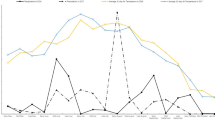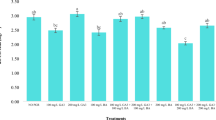Abstract
THE present investigation was to determine whether the effect of gibberellic acid in causing chlorosis was due to an interference in chlorophyll formation or to some secondary effect1. Pisum sativum var. Meteor were grown in the field in a block arrangement, and alternate rows were treated with gibberellic acid (Y.F. 4961, Plant Protection, Ltd.). Gibberellic acid diluted to 100 p.p.m. with water was sprayed on the upper surface of the plant 10 days after emergence.
This is a preview of subscription content, access via your institution
Access options
Subscribe to this journal
Receive 51 print issues and online access
$199.00 per year
only $3.90 per issue
Buy this article
- Purchase on Springer Link
- Instant access to full article PDF
Prices may be subject to local taxes which are calculated during checkout
Similar content being viewed by others
References
Brian, P. W., Biol. Rev. Cambridge Phil. Soc., 34, 37 (1959).
Brown, R., and Rickless, P., Proc. Roy. Soc., B, 136, 110 (1949).
MacKinney, G., J. Biol. Chem., 140, 315 (1941).
Wolf, F., and Haber, A., Nature, 186, 217 (1960).
Author information
Authors and Affiliations
Rights and permissions
About this article
Cite this article
BISHOP, P., WHITTINGHAM, C. Gibberellic Acid and Chlorophyll Content of Leaves of Meteor Peas. Nature 192, 576–577 (1961). https://doi.org/10.1038/192576a0
Issue Date:
DOI: https://doi.org/10.1038/192576a0
This article is cited by
-
The influence of ancymidol on morphology, anatomy, and chlorophyll levels in developing and mature Helianthus annuus leaves
Plant Growth Regulation (1990)
-
Effects of chemical agents in inhibition of chlorophyll synthesis and chloroplast development in higher plants
The Botanical Review (1977)
-
Gibberellins�ure und Chlorophyllgehalt des Blattes von Phaseolus vulgaris L.
Planta (1968)
Comments
By submitting a comment you agree to abide by our Terms and Community Guidelines. If you find something abusive or that does not comply with our terms or guidelines please flag it as inappropriate.



